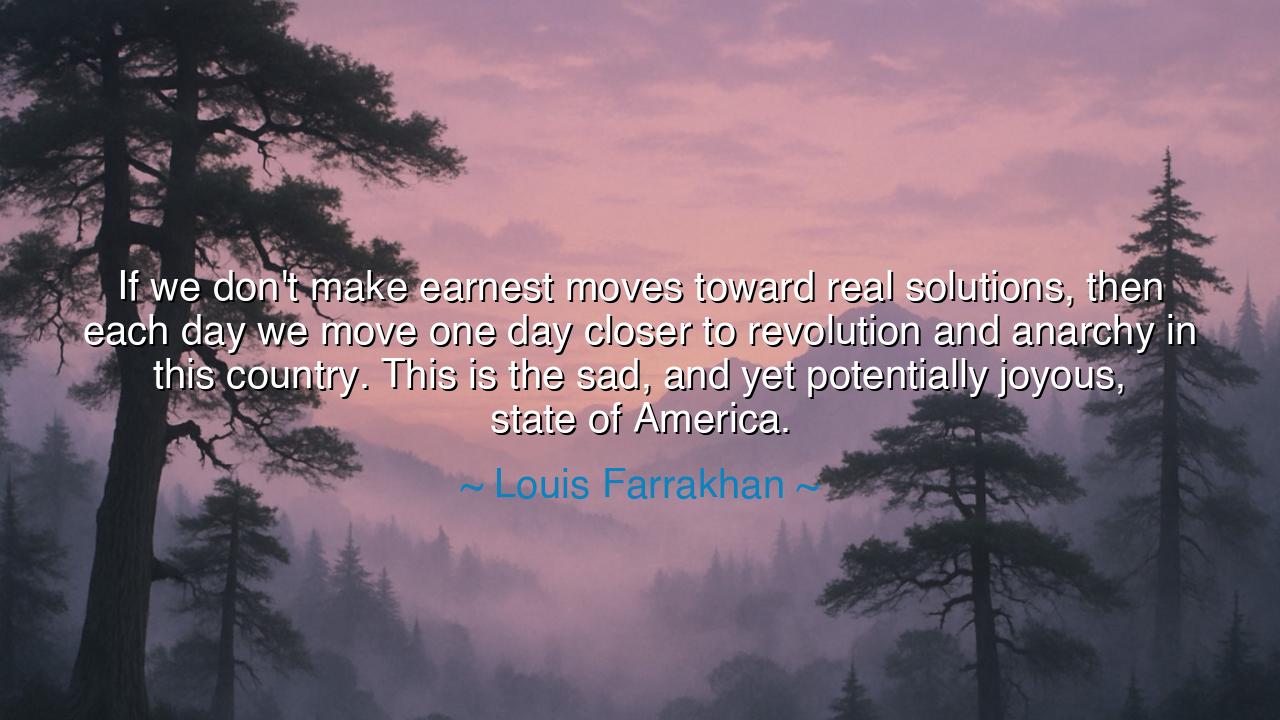
If we don't make earnest moves toward real solutions, then each
If we don't make earnest moves toward real solutions, then each day we move one day closer to revolution and anarchy in this country. This is the sad, and yet potentially joyous, state of America.






In the commanding words of Louis Farrakhan, both warning and revelation are entwined: “If we don’t make earnest moves toward real solutions, then each day we move one day closer to revolution and anarchy in this country. This is the sad, and yet potentially joyous, state of America.” These words strike like the tolling of a great bell — a sound that calls a people to awaken from their slumber before the fire consumes the house. They speak to a truth as old as civilization itself: that when justice is delayed, when truth is ignored, and when power hardens its heart against compassion, the people’s patience will one day ignite into flame. Yet even in this prophecy of unrest, Farrakhan offers a strange and sacred hope — that out of chaos may come renewal, and out of despair, rebirth.
To understand the depth of this saying, one must first grasp the duality within it. Farrakhan calls the state of the nation both sad and joyous. Sad, because injustice still thrives — because inequality, corruption, and greed have made the earth heavy with sorrow. But joyous, because even within that darkness lies the possibility of awakening. For revolution, though born of pain, is also the midwife of progress. It is the fire that consumes decay so that something purer may grow. This paradox — that destruction may precede rebirth — is one that the ancients knew well. They saw in the lightning not only wrath, but illumination; in the storm, not only peril, but cleansing.
Consider the lesson of the French Revolution, that great tempest which tore through the old world’s order. The people of France had suffered hunger and humiliation under the weight of monarchy. Their cries for bread went unanswered; their pleas for dignity were met with indifference. And so the storm broke. The streets ran red, the throne was overturned, and from that chaos arose the idea that no man is born above another. Though tragedy and terror shadowed that time, it also gave birth to a new dawn — the birth of the modern spirit of liberty. This is what Farrakhan means by the “potentially joyous” side of turmoil: that even from the ashes of despair, humanity can rise transformed.
But the prophet’s warning is clear: revolution need not come if wisdom prevails. Farrakhan’s plea is not for destruction, but for action — for earnest movement toward real solutions. He condemns not the people’s passion, but the leaders’ neglect. For when those in power turn deaf ears to the cries of the poor, when communities are left to decay, and when the hearts of men grow cold with indifference, the ground beneath the nation begins to tremble. The call is simple yet profound: to act before the eruption, to heal the wound before infection spreads. Every generation is given a choice — to address injustice through reform, or to ignore it until revolution becomes inevitable.
The ancients often said that a nation is only as strong as its justice. The Pharaohs of Egypt fell when they hardened their hearts against their people. Rome, mighty and proud, crumbled not from foreign conquest, but from the rot within — from corruption, division, and moral decay. So too does Farrakhan warn America: that without humility, without compassion, without honest reform, even the most powerful empire will one day face reckoning. His words are not the echo of anger, but the call of accountability — a reminder that peace is not preserved by silence, but by righteousness.
And yet, the light of hope shines through his prophecy. Farrakhan calls the situation “potentially joyous” because he sees that revolution need not mean chaos — it can mean awakening. If men and women of conscience act now — if communities unite, if leaders listen, if truth is spoken with courage — then what might have been a time of collapse can become a time of rebirth. The revolution he speaks of need not be one of blood and fire; it can be a revolution of the spirit, of values, of compassion restored. This is the higher path, the divine evolution that arises when people choose wisdom over violence, and unity over vengeance.
So the lesson, my children, is this: do not wait for the storm to come before you repair your house. Seek justice not when it is fashionable, but when it is necessary. When you see wrong, confront it; when you see division, heal it; when you see apathy, awaken love. For if we do not build peace through truth, we shall be forced to learn it through pain. Every citizen bears this sacred duty — to act, to serve, to speak, and to care. This is how nations endure; this is how humanity survives.
And thus, in the ancient cadence of prophecy, we return to the heart of Farrakhan’s wisdom: “If we don’t make earnest moves toward real solutions…” The warning is grave, yet the promise remains — that from sincerity, courage, and unity, even a nation on the brink can be saved. Let every man and woman take heed, and let them remember: revolution begins not in the streets, but in the soul. If we heal the heart, we heal the world — and from that healing, the joyous state of humankind may yet arise.






AAdministratorAdministrator
Welcome, honored guests. Please leave a comment, we will respond soon